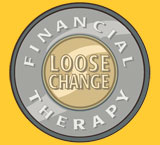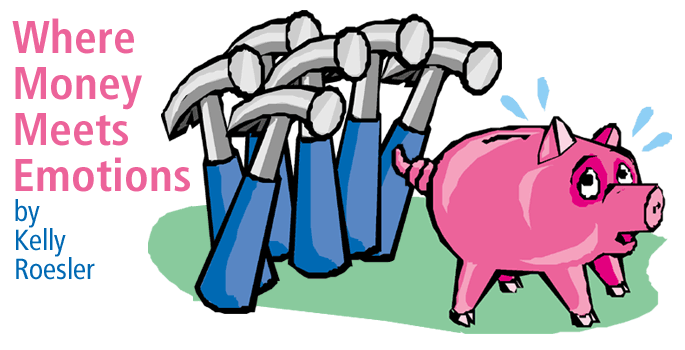A Toronto organization called Loose Change offers guidance for the financially lost, and helps them conquer their negative feelings.
Imagine a place where money and feelings come together. A place to turn for both financial analysis, and shoulders to cry on when money worries turn you into an emotional wreck.
For many people who find themselves facing a financial crisis, it would be easier to reveal the details of their sex life with a therapist than to come clean with an accountant about their own spending habits.
“This is because of a feeling of shame that arises for many people who are grappling with money issues,” says Amanda Mills, a Toronto crisis counsellor with a background in business management. Ms. Mills, 50, is the founder of Loose Change, an organization that offers guidance and a listening ear for the financially lost.
“There never has never really been an appropriate place for our financial angst,” reads Loose Change literature. “Crying in the accounts office is embarrassing, and often finances are not the therapist's strong suit.”
Loose Change provides both group and one-on-one counselling. Founded three years ago in Toronto, the financial therapy group is taking their money-meets-feelings philosophy to Ottawa for a workshop on June 17.
“People are willing to talk about anything else,” she said. “But in terms of how one manages their own money - people don't share that.”
“And money management can be a very explosive issue,” she said. “Everyone has strong feelings about it. A lot of power is assigned to money.”
“Loose Change is an important link for clients facing their financial dilemma and reaching out for help,” she said.
“Facing your money problems is like facing the dragon. It's hard to do.”
Loose Change holds a philosophy that sets it apart from most other credit and debt counselling services. “Accountants are not comfortable in the emotional world. There is no room for messiness there,” she said. “Well, emotions are messy.”
At the heart of Loose Change is the belief that money and emotions are intertwined. Ms. Mills has seen first hand the wide range of emotions that money can evoke in almost anyone.
“It can make you feel really ashamed, or really high. There's sadness, grief and even rage. Rage is a fairly common one.”
Ms. Mills said that most of the dealings that people have with money are directly related to how their parents managed their finances. Clients are encouraged to explore their 'money roots'.
“The first thing we do is give clients a questionnaire, asking about their mother and father's attitudes toward money and spending habits,” she said.
“We look at key events that shape people's attitudes toward money.”
Often she sees clients whose financial habits have been set by negative childhood experiences. Her job is to help them move forward and let go of the baggage. “What I don't want is a Band-Aid solution. There is a pattern that needs to be examined and revised over time.”
The focus is less on clearing past debts, and more on changing the clients attitudes and outlook about their financial status, regardless of credit ratings or history.
The idea is to help the client to get to the point where they are making more money than they spend - in other words, generating capital.
“If you're making more than you spend, you won't need credit. But good credit will follow.”
Having worked as a crisis counsellor for a Toronto distress centre, and with her experience in business management, Ms. Mills saw that there was a need to help people grappling with financial issues to come to terms with their emotions.
“I realized that money was emotional. Whether it is someone with a huge debt load or hardly any at all, there is always an element of emotion.”
In its workshops, Loose Change combines therapeutic and business management techniques, which are designed to let the client see their pattern of financial problems, and also to break down some of the most common money myths.
Many clients have fallen prey to some of the most common money myths. Some of these myths include the belief that “money is evil.”
“A lot of people are under-employed because of this myth. It's just not a useful way of thinking.”
Another common myth is the “I bought it because I deserve it” excuse. “It has nothing to do with deserving,” Ms. Mills said. “ I try to get them thinking about it in another way - I bought it because I wanted it.” This is just one of the ways Loose Change encourages clients to assert greater control over their money.
Confronting these money myths is an integral part of the workshops, said Ms. Mills.
“I have them sit down and think of ways to challenge the myths. I encourage them to really look at the fact that the myth is not true, and see how it will hurt in their heart.”
In the years since Ms. Mills founded Loose Change, she has not only helped individuals but also couples who struggle with financial troubles.
“There can be a lot of division between conflicting money personalities,” she said. What is a money personality? Well, for instance, there are spenders, savers and hoarders to start. There are also the people who, through their spending habits, seek to buy love and happiness and spend to feel better or comfort themselves. And then there are the people who believe that money equates success and spend more than they earn, living beyond their means. “This becomes an addiction. It's quite cyclical.”
And there are those who believe that if they just had a little more money, they would finally achieve freedom. “Money will give you more options, but it is not freedom,” said Ms. Mills.
“I see people who are missing freedom, looking to make the extra dollar.”
Ms. Mills describes herself as an ally of her clients, and said that ultimately her job is to get their money to work for them.
“People are so relieved to come in and talk about money in the context of their life,” she said. “It goes from the totally bizarre to the totally mundane.”
And the most important aspect of Loose Change, said Ms. Mills, is the freedom to talk and explore the bigger issues that may affect a person's attitude toward money and handling of their finances. It's important to note, she said, that money is not as cut-and-dry as it may seem.
“The issues are more complex, and hard to talk about. Money is such an important part of life, but it is not strictly a financial issue.”
THE OTTAWA CITIZEN - June 13, 2004
To download a copy of this article click here.
If you have Acrobat installed on your computer the application will open automatically, if you require Adobe Acrobat please visit www.adobe.com, download the free Acrobat Reader and then return to this page.
Return to About Loose Change Page
LOOSE CHANGE INC.
720 Spadina Avenue, Suite 513
Toronto, ON • M5S 2T9
Tel: 416-466-4435 • Fax: 416-466-3818
Email: info@loosechange.ca


